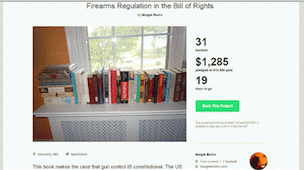My guest today is investigative journalist Margie Burns. Welcome back to OpEdNews, Margie.
JB: We last talked back in 2009. At that time, the topic was health care. What are you working on now?
MB: Thank you, Joan; good to be back in touch with you. The issue I am working on now is gun violence. For the last two to three years, most of my writing time has gone to this book on the topic, now finished but unpublished. The title is Firearms Regulation in the Bill of Rights: Eighteenth-Century English Usage and the U.S. Constitution. As I mentioned to you, I am trying to raise the cost of printing through Kickstarter. [Link here]
JB: What got you interested enough in this topic to dedicate several years of your life to it?
MB: It started with Newtown. After the terrible mass shooting at Sandy Hook Elementary School, I was dismayed when even some well-meaning people wrote that laws regulating deadly weapons would be 'unconstitutional'. There seemed almost a presumption that we are helpless to do anything about deadly violence. So I resolved to go through the U.S. Constitution and the Bill of Rights word by word, if necessary. (My doctorate and training were in English, after all; you could call the project 'an English major looks at the Bill of Rights'). So I did. The project ended up involving research into thirteen centuries of English language usage, which took a while. But I wanted to check for myself--to find out whether anything in these vital documents actually says that we cannot have gun control. In the process, I found that the English in the Bill of Rights is being misconstrued.
JB: Now we're getting to the crux of the matter. Explain your last statement, please. Lots of arguments have been made based on people's various understandings of what's constitutional.
MB: I do not want to give away all the specifics. But parts of the MS have been read by people including a couple of attorneys and a couple of endowed-chair English profs. The no-limits interpretation of the right to bear arms is debunked by the wording of the amendments in the Bill of Rights. My hundreds of sources include English dictionaries from the eighth century on, public documents from the entire history of this country, and many earlier English documents, along with relevant scholarship.
The idea underlying the book is simple in some ways: there is no such thing as an unlimited right, in human society. Yes, gun control is a contentious topic. But one incontestable point is very simple: at no time in English-to-American history was there ever a period when individual rights were conceived as absolute. Really, check it out. Literally, there has never been a time when writers in English, anywhere, upheld a concept of an unlimited right, in human society. Such a right just didn't exist. Still doesn't.
As an old friend pointed out, not even the NRA says (openly) that rights are unlimited. Presumably not even the NRA advocates allowing individuals to possess machine guns, rocket-propelled grenades, or surface-to-air missiles, all of which can be classified as 'arms.' (This particular old friend flew helicopters in Vietnam. He's a good writer, too. We had the same English teacher throughout high school.) If virtually everyone including the NRA accepts limitations, then the discussion should be about what limitations are feasible and appropriate. There is disagreement even here, of course; some people want to repeal or change the 2nd Amendment. My Viet-vet old friend concluded, "Personally, I would say, damn the Second Amendment, no one should have guns. The Founding Fathers are not gods nor are their words holy and infallible."
This is not my conclusion. I want to rescue the Second Amendment, not scrap it. In my view, we have more than enough linguistic evidence to correct recent misreadings of the language. We are not safe when we misread it, and especially not when federal judges misread it. I am well aware that I am not a lawyer--the only law course I ever took was in constitutional law--but as someone who loves American history, I also remember that the U.S. Supreme Court previously supported slavery, supported segregation, and opposed voting by women. If the high court reversed course--rightly--on those issues, it can surely revisit recent rulings tainted and compromised by misreading simple English.
JB: Readers can support the publishing of this book by clicking on this Kickstarter link. How does it work exactly? What's your deadline? And who's your target audience?
(Note: You can view every article as one long page if you sign up as an Advocate Member, or higher).







